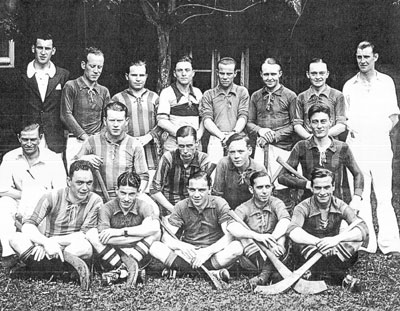|

The Fahy Boys hurling team
(Photographer unknown, ca.1940) |
Like many other aspects of Western culture, sport can be traced back to ancient Greece, where it played an important role in society, particularly for religious and aesthetic purposes. It was in ancient Greece that the concept of sport as a competitive activity developed, the most well-known manifestation being the Olympic Games which were held from 776 BC to 394 AD. Modern organised sport began to emerge in late eighteenth-century Britain and reached it zenith during the mid-Victorian period (1850-1873) with the codification of various types of ‘traditional’ football.
Latin America was one of the first regions to benefit from the diffusion of these modern sporting innovations. In continental Latin America, in contrast to the Caribbean region, the diffusion process took place through the bonds of informal empire associated with trading and capital investment, rather than through formal colonial mechanisms. Argentina, as the country whose economy was most heavily influenced by the British, was also one of the earliest countries to embrace modern British sports. By the early twentieth century, these modern British sports had become an integral part of Argentine culture. They have picked up the ball of British sport and run with it with more vigour than any other non-English speaking nation (Carlin, 2007). As Argentina was also the recipient of the largest number of Irish immigrants in the region, the Irish, as part of the wider English-speaking community generically termed
ingleses, were to play a significant role in the diffusion and development of these new sporting innovations.
As the articles in this journal
demonstrate, the contribution of the Irish and subsequently Irish-Argentines to the sporting landscape was varied and wide-ranging. Many Irish people who worked for British-owned railways or businesses were either co-founders or members of the first sports institutions, initially cricket clubs and later football and rugby clubs. Some also contributed to the Argentine national team in the early days of football. Some Irish immigrants who had settled in the countryside and progressed from labourers to landowners became connected with the development of equestrian pursuits such as horseracing and polo, which is covered in the essays by Murray and MacLoughlin. Beyond the boundaries of the community of
ingleses, Irish immigrants and their families also made a contribution, particularly in the field of education; the most notable example being Dr. Santiago Fitzsimons, a pioneer of physical education in the Argentine school system, which is detailed in
‘The Sporting Dimension to the Relationship Between
Ireland and Latin America’ essay by Kennedy. Irish and Irish-Argentines were not only influential in the development of British sports, but also those of North-American provenance such as basketball, as examined by Kennedy. Furthermore, the impact of the Irish in sports was not
just confined to Argentina, but also extended to Spain, as explored in the article by Burns, which documents the story of Patrick O’Connell, the Dublin-born player who went on to manage five Spanish clubs, most notably FC Barcelona.
The Irish Diaspora were not removed from the profound cultural and political developments that were occurring in late nineteenth-century Ireland, such as the trends towards Home Rule and cultural nationalism. Such developments were to have an impact on the Diaspora in Argentina, where some of the community carved out a more distinct ethnic and social identity from the wider community of
ingleses. These changing relationships are examined in this edition. Among the earliest expressions of these developments was the founding of distinct Irish association football clubs in the 1890s, such as Lobos Athletic Club and Porteño Athletic Club, as examined in Raffo’s essay. An obvious progression of this growing consciousness of Irish identity was the importation of the sporting elements of cultural nationalism as exemplified by the setting up of Buenos Aires Hurling club in 1900, analysed here by Quinn.
Participation in sport was also shaped by social class, rather than just ethnicity. Murray examines how many Irish were attracted to Argentina by the possibility of becoming landlords, a progression in Ireland that would not have been attainable. Many of these became involved in equine sports, in particular horseracing, which was associated from its early years with nobility, landownership and masculine behaviours. As Murray illustrates, a disproportionate number of Irish or Irish-Argentines were founders of the exclusive Jockey Club of Buenos Aires, indicating the social and economic advancement of the former tenant farmers. The article on polo by MacLoughlin also illustrates this social and economic advancement. In contrast, as Quinn demonstrates, Hurling Club never attracted this traditional rural population of wealthier Irish immigrants to their fold; the club was almost exclusively made up of Irish or Irish-Argentines with more urban working and middle-class backgrounds.
The internationalisation of sporting culture from the mid-twentieth century onwards involved reciprocal interactions, with Latin Americans becoming innovators in various sporting disciplines, in particular football, polo and to a lesser extent rugby, and introducing these innovations to Europe and further afield. This interaction is eloquently illustrated in the biographical profile of the footballer Alfredo di Stéfano. Other aspects of reciprocity include the small but high-profile presence of Latin American players in Irish provincial rugby teams, including Felipe Contepomi, who is interviewed in this edition.
John Kennedy
References
- Carlin, John ‘In the hands of God’ in
Observer Sports Monthly (London), 25 November 2007,
accessed on-line 2 January 2008. |

